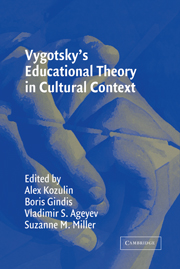Book contents
- Frontmatter
- Contents
- List of Contributors
- Series Foreword
- Introduction: Sociocultural Theory and Education: Students, Teachers, and Knowledge
- PART I CONCEPTS AND PARADIGMS
- PART II DEVELOPMENT AND LEARNING
- PART III SOCIOCULTURAL THEORY APPLICATION IN THE CLASSROOM
- PART IV DIVERSE LEARNERS AND CONTEXTS OF EDUCATION
- Author Index
- Subject Index
- Titles in the series
Series Foreword
Published online by Cambridge University Press: 05 June 2012
- Frontmatter
- Contents
- List of Contributors
- Series Foreword
- Introduction: Sociocultural Theory and Education: Students, Teachers, and Knowledge
- PART I CONCEPTS AND PARADIGMS
- PART II DEVELOPMENT AND LEARNING
- PART III SOCIOCULTURAL THEORY APPLICATION IN THE CLASSROOM
- PART IV DIVERSE LEARNERS AND CONTEXTS OF EDUCATION
- Author Index
- Subject Index
- Titles in the series
Summary
This series for Cambridge University Press is becoming widely known as an international forum for studies of situated learning and cognition.
Innovative contributions are being made by anthropology; by cognitive, developmental, and cultural psychology; by computer science; by education; and by social theory. These contributions are providing the basis for new ways of understanding the social, historical, and contextual nature of learning, thinking, and practice that emerges from human activity. The empirical settings of these research inquiries range from the classroom to the workplace, to the high-technology office, and to learning in the streets and in other communities of practice.
The situated nature of learning and remembering through activity is a central fact. It may appear obvious that human minds develop in social situations and extend their sphere of activity and communicative competencies. But cognitive theories of knowledge representation and learning alone have not provided sufficient insight into these relationships.
This series was born of the conviction that new and exciting interdisciplinary syntheses are under way as scholars and practitioners from diverse fields seek to develop theory and empirical investigations adequate for characterizing the complex relations of social and mental life and for understanding successful learning wherever it occurs. The series invites contributions that advance our understanding of these seminal issues.
- Type
- Chapter
- Information
- Vygotsky's Educational Theory in Cultural Context , pp. xiii - xivPublisher: Cambridge University PressPrint publication year: 2003

